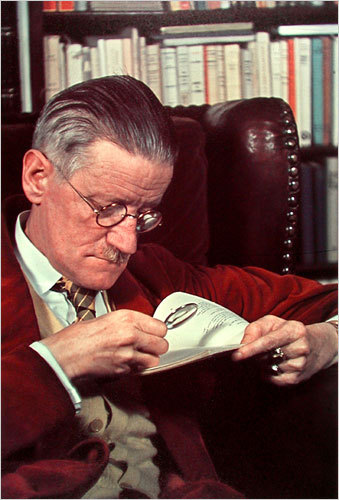On the power and imagination of James Joyce's work

'We are still learning to be James Joyce's contemporaries, to understand our interpreter.'
Richard Ellman, James Joyce
I first encountered James Joyce as an English Literature undergraduate. As part of an introduction to European literature, we read A Portrait of the Artist as a Young Man alongside works by Jane Austen, Charles Dickens and other big names from the canon. Joyce's book stood out immediately; it was clear from the first page that he seemed to reject the traditional forms other novels had adopted. In doing so, he appeared to be questioning the validity of representation itself, evoking a protagonist coming-of-age in a way that was self-conscious about its own linguistic construction. Quite a feat.
But this was not simply some contrary display of cleverness, some point-to-be-made that led nowhere but intellectual cul-de-sacs and literary dead-ends. Oh, no. A Portrait of the Artist as a Young Man seizes upon this impasse, this challenge, and perceives its awareness of language and identity construction as an opportunity for liberation. If the novel's protagonist is never more than a linguistic composition then so be it, but Joyce joyfully manipulates this inconvenient truth and moulds a whole new form for the novel in the process.
A Portrait of the Artist as a Young Man was not what I expected from a novel as an undergraduate; I was knocked-sideways by the daunting complexity of the prose, but intrigued by its rich and vibrant references and allusions. Joyce used classical archetypes and every-day experiences together in a way that deconstructing boundaries between high and low culture, while offering a whole new perspective on the novel and on human experience.
As a result, it was both grand and humbling at the same time. It was enlightening in some ways, but confusing in others. Exciting in one paragraph, infuriating in the next. But while Joyce's novel offered something of a hard slog to a reader such as myself, mired up to that time in classical realism and traditional narratives, it also offered more. It was rewarding, and much of the charm and wit and fun of the book stays with me today.
I haven't yet attempted to read Joyce's other novels. I never found the time for Ulysses, and Finnegans Wake was just too daunting. But over the last few months I've seen Joyce's name recur time and again. My interest in the writer Samuel Beckett is probably the root of the resurgance, a fellow Irish writer who as a young man spent much time in Joyce's company. As the older writer began to experience difficulties with his sight, Beckett was one of many friends/admirers on-hand to help in any way they could. While living in Paris, Beckett even aided the transcription of Finnegans Wake.

Much has been made of the influence James Joyce has held over Beckett's work, and all of the younger writer's earlier short stories and poems bear a distinctive imprint. None were so aware of this connection than Beckett himself, who affectionately confided to a friend that the style of some of his early writing 'stinks of Joyce'. As a result, Beckett later moved into forms and styles that he could more call his own; and to a large degree, the hallmark of his later works is also indebted to Joyce, if only insofar as they work in opposition. Joyce wrote through knowledge; Beckett wrote through ignorance. Joyce wrote with a rich and vibrant style; Beckett worked towards a prose 'without style', a prose of poverty.
And yet, despite their disparities, there is still much they have in common. Samuel Beckett, for instance, was renown for his interest in the outsiders, the mad, the old and the strange. But Beckett's affinity was in the commonplace, so often disregarded by novels in the English literary canon, and Joyce held a similar interest. In the introduction to Ellman's grand biography of James Joyce, there is a telling summary of the writer's approach to characters:
'[Joyce said:] 'Don't make a hero out of me. I'm only a simple middle-class man.' He surrounded himself with people who were mostly not known: some were waiters, tailors, fruitsellers, hotel porters, concierges, bank clerks, and this assemblage was as inevitable for Joyce's temperament as marquises and marchionesses were for Proust's. To those who admonished him for wasting his time, he replied, 'I never met a bore,' a remark that from most writers would sound merely sentimental. That he meant it is demonstrated by the thousands of phrases garnered mostly from undistinguished friends with which he filled his books. 'This book,' he said to Eugene Jolas of Finnegans Wake, 'is being written by the people I have met or known.'
Richard Ellman, James Joyce
Joyce celebrates a grandiose presentation of every-day life that uses language jubilantly to express and elevate the mundane. There are a number of fantastic introductory books on Joyce's life and his writing, Richard Ellman's biography and Anthony Burgess's Re Joyce being particularly good, but there is perhaps nothing quite so engaging as the novels and short stories themselves. I'm beginning to think that I should give Joyce another whirl, and see where it leads me.
Ellman has said that Joyce 'requires that we adapt ourselves in form as well as in content to his point of view. His heroes are not easy liking, his books are not easy reading. He does not wish to conquer us, but have us conquer him. There are, in other words, no invitations, but the door is ajar.' All of the great writers, musicians and artists have produced works that do not come to us, we are always expected to go to them. And there is nothing to stop us. The door is ajar.


